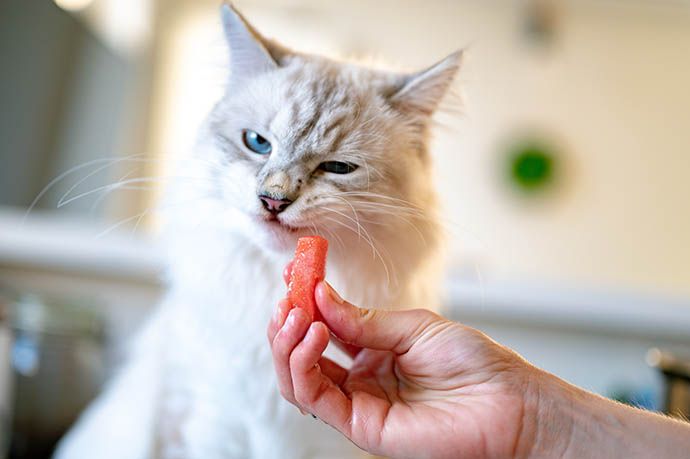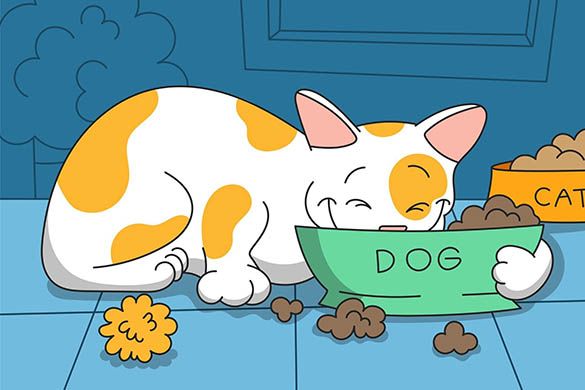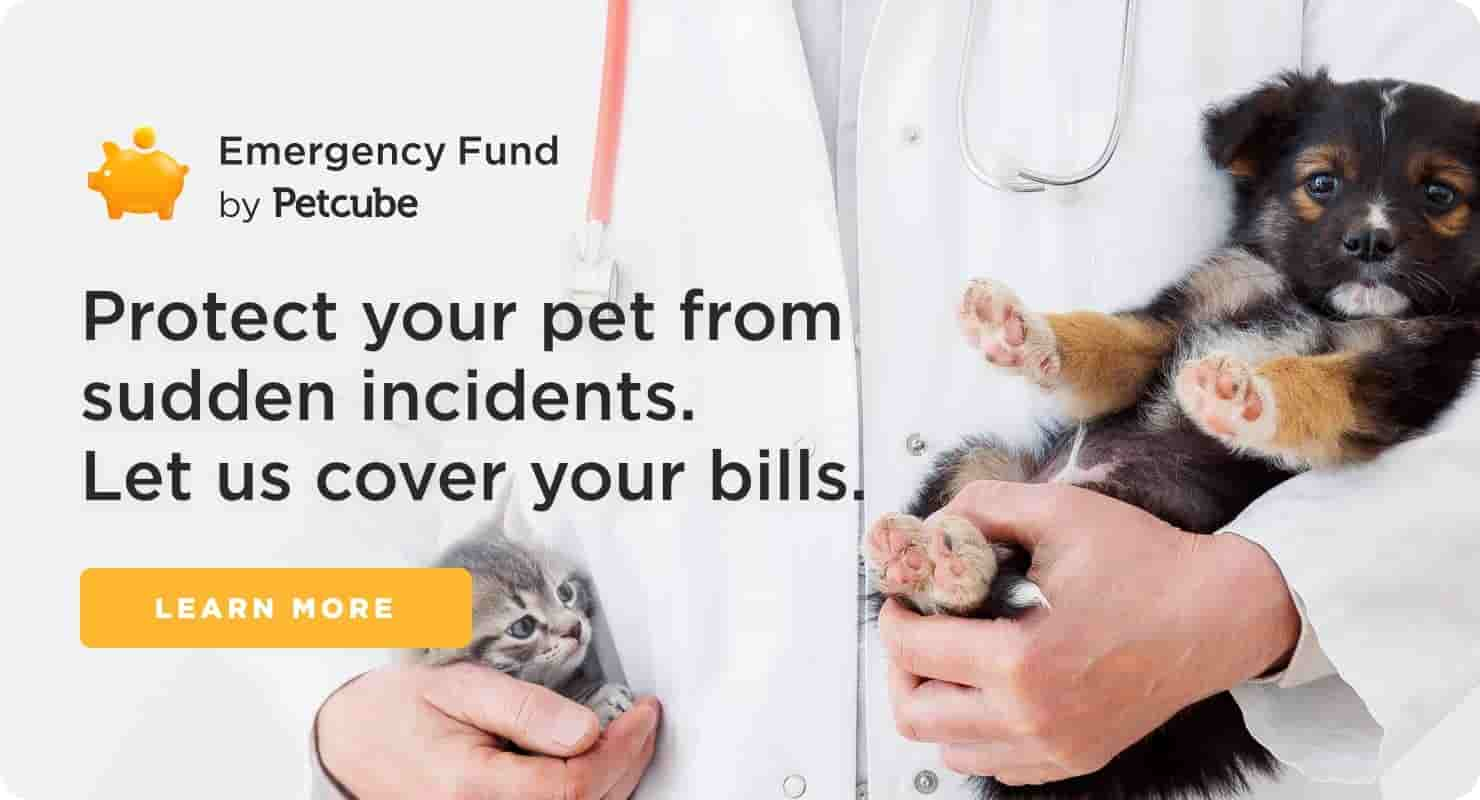Cats are notoriously fussy when it comes to their food. So, if you’ve ever found yourself unexpectedly without food for your cat and wondering what to do, we feel you. You wouldn’t be the first cat owner to eyeball the doggie chow and wonder if it’s ok to give your cat dog food until you can get to the store to stock up on Sir Pounce’s usual food of choice.
It might even be that you caught your sweet feline sneaking a nibble from the dog’s bowl and are wondering if it’s safe for your cat to eat dog food. It’s rare for cats to even want dog food, but if they do take a liking to it, should you be concerned?
We’ve got you covered. Read on to find out everything you need to know about cats eating dog food.
Is it safe for cats to eat dog food?
In small quantities, dog food is most likely fine for cats to consume. But it’s important to remember that dogs and cats are different species of animals and so will have vastly different nutritional needs. In the short term, you can get away with giving your cat dog food, but over the long-term your cat may begin to experience complications and health issues.
Difference between cat food and dog food
For a start, cat food has a much higher protein content than dog food. Cats are obligate carnivores which means they require meat-based proteins and animal fats for optimal nutrition. Dogs, on the other hand, are omnivores and will therefore thrive on a diet of meat, as well as some vegetable content.
In addition to this, cats don’t taste in the same way dogs do. While dogs love cat food for its high protein content, cats rarely seek out dog food, as it simply doesn’t appeal to their tastes. The reason is that felines have a different taste system, so their food is specially formulated to appeal to these specific tastes.
For example, cats can’t taste sweetness, while dogs can. According to the research based on the changes in the sweet receptor gene, cats show indifference to both sweet carbohydrates and sweeteners. Perhaps, cats picky eating habits were developed around the remaining taste receptors.
Cats require their food to contain certain special ingredients that aren’t typically included in dog foods. A cat’s body cannot produce taurine (an amino acid that’s important for digestion, vision, and heart health) as well as arachidonic acid, a fatty acid that dogs are able to produce on their own. A lack of arachidonic acid in a cat’s diet can lead to abnormal liver and kidney functioning, improper blood clotting, and an increase in skin problems.
Vitamin A is another important dietary element that cats require. Dog food often does include vitamin A, however, it’s rarely at the levels that cats need.
Carbohydrate needs differ greatly between dogs and cats. A cat requires far fewer carbs in their diet, and a diet too high in carbs can lead to weight gain and other issues including diabetes. Dogs, on the other hand, require significantly more carbohydrates in their diet, usually derived from plants, which cats don’t generally eat.

Can kittens eat dog food?
A cat’s nutritional needs change throughout their life. What is an appropriate food for a kitten will not always provide adequate amount of vitamins, protein, and other nutrients for an adult cat or a senior cat.
Young cats and pregnant cats will generally require a higher energy content in their food to use in growth, while older cats will need a higher protein content to maintain their muscle mass.
Dog food and treats are rarely adequate for any stages of a cat’s development due to their lack of the amino acids, fatty acids, vitamins, and minerals that cats require.
I caught my cat eating dog food. What do I do?
If you’ve caught your cat sneaking snacks from the dog’s bowl, there’s probably no need to panic. A bite or two of canine cuisine won’t harm your cat, but it certainly won’t be fulfilling your cat’s nutritional needs. A nibble here and there is ok, but dog food should never make up the main part of your cat’s diet.
As we’ve mentioned, cats and dogs have very different nutritional needs, so dog food will never be nutritionally complete for your cat and cat food will never provide optimum nutrition for your dog.
The only real hazard to your cat from eating dog food is that your cat is likely to pick up some weight because of the high carbohydrate content in dog food. Not to mention that your cat is likely consuming dog food over and above their normal food, so we’re looking at a significant calorie surplus.
More concerning is the potential for food allergies and sensitivities. While not very common, your cat may show signs if the dog food contains an ingredient that doesn’t agree with them. Be on the lookout for gastric symptoms like diarrhea and vomiting, a change in toilet habits, itching, and excessive scratching, and over-grooming, and contact your vet if your cat shows any uncommon symptoms.
How to keep a cat from eating dog food
If your cat is frequently stealing food from the dog bowl in addition to devouring their own food, it can quickly lead to weight gain, especially considering that dog food contains a higher carbohydrate content than cats typically require. So how do you keep your cats from stealing from the dog’s bowl and vice versa?
The easiest solution to cats and dogs pilfering from each other’s bowls is to feed them in separate areas. Eating is not typically a social occasion for cats, and they prefer to dine privately without an audience, anyway.
If you’re short on space to keep pets separated during mealtimes, your solution would be to supervise your pets during feeding times. That way you can intervene when one starts to eyeball the other’s food. It usually takes around 10 to 20 minutes for your pets to finish eating, then you should pick up their bowls and remove any unfinished food.
Free feeding of pets is usually discouraged, as it can cause weight gain, especially in cats or dogs who live predominantly indoors and may tend towards boredom.

Can cats get sick from eating dog food?
If your cat occasionally eats dog food, there’s probably no need to worry. You should, however, keep an eye on your cat for signs that the food isn’t good enough for them.
Look for signs of allergies, including vomiting, diarrhea, hair loss, behavioral changes, as well as excessive scratching or grooming. If your cat shows signs of allergy or sensitivity, contact your vet for advice. Before chatting to your vet, note down which dog food your cat has eaten to help the vet make a diagnosis and determine the best course of action.
Can you feed a cat dog food in an emergency?
Sure, if you’ve run out of your usual cat food and you’re in a bind, it should be ok to give your cat dog food to tide them over until you can get to the shops. Outside of emergencies, however, you should always select high-quality food for your cat that is formulated specifically for your cat’s nutritional needs.
Can cats eat wet dog food?
Some experts believe wet food to be preferable because cats are not big water drinkers and the moisture in wet food helps maintain hydration.
In the end, your cat will let you know which food they prefer between wet or dry. What is more important is that you choose a high-quality food that is high in protein, low in carbohydrates, and fortified with the necessary vitamins, minerals, and fatty acids that your cat requires.
Raw food is gaining popularity as it is believed to mimic a cat’s diet in the wild. Free feeding is especially discouraged with a raw diet as pathogens can develop and spread to the rest of the household, including humans.
Takeaways
Dogs and cats have very different nutritional requirements, so the occasional nibble of dog food probably won’t harm your cat. Feeding your cat exclusively on dog food will lead to health issues in your cat, as their nutritional needs will not be adequately met.
If you don't have a viable choice and need to feed your cat dog food, then it should be fine. But it’s a good idea to keep an eye on your cat for any potential allergic reactions or sensitivities.
If your cat is stealing snacks from the dog’s bowl, there’s no need to panic. But it’s a good idea to stop this kind of behavior as dog food tends to have a higher carbohydrate content than what cats typically require. The downside of this is that the high carbs in dog food can cause weight gain in cats and can lead to other issues like diabetes.
Using Emergency Fund To Cover Pet's Emergency Needs at an Affordable Price
Petcube has revamped the traditional pet insurance to meet the most common emergency needs at an affordable price. Talk to a vet online any time of the day, get $3,000 in an emergency for up to six pets for $29 per month.
Emergency Fund provides you with 24/7 access to authorized veterinarians, most of whom have more than 10 years of experience. You can ask any questions regarding your pet's wellbeing, including general health, nutrition advice, second opinions, allergies, behavioral questions, or anything else your pet might be encountering
Was this article helpful?
Help us make our articles even better







